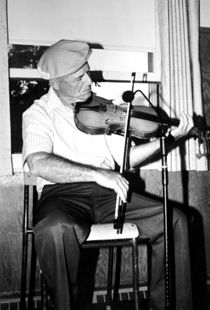Viola P. Léger, OC, ONB, senator, actor, director, teacher (born 29 June 1930 in Fitchburg, Massachusetts; died 28 January 2023 in Dieppe, NB). Viola Léger served in the Senate from 2001 to 2005. She is perhaps best known for her career as an actor and for her performance as La Sagouine in Antonine Maillet’s play of the same name. Léger performed the role 3,000 times between 1971 and 2016. Widely considered the greatest Acadian actress of all time, she was also a prominent advocate and global ambassador for Acadian people and Acadian culture. She was made a Chevalier de l’Ordre des Arts et des Lettres de la France and a Member of the Ordre des Francophones d’Amérique. She also received the Governor General’s Performing Arts Award for Lifetime Artistic Achievement in theatre.
Early Life and Education
Viola Léger was born to Acadian parents in Fitchburg, Massachusetts. She recalled that there were many French Canadians and Acadians in Fitchburg at the time. While she grew up speaking English outside the house, French was spoken within. At the age of 18, she left Massachusetts for New Brunswick to study teaching in French at the Université de Moncton. While there, she earned a BA and a BEd.
Léger then became a nun and bonded with her colleague Antonine Maillet. She also taught high school literature and drama for 15 years. At the age of 38, she earned a master’s degree in theatre education from Boston University. She then studied in Paris with acclaimed theatre artist Jacques Lecoq, who encouraged Léger to perform.
Acting Career
Viola Léger’s acting career happened somewhat by accident. Despite considerable experience teaching acting and drama to high school students and her education in the dramatic arts, she didn’t begin to act in earnest until her early 40s. In 1971, Antonine Maillet asked Léger to perform a few excerpts from her new book, La Sagouine, which had not been publicly launched yet. Léger went on to perform the role 3,000 times across Canada, the United States, France and Belgium, and in both English and French. Maillet later credited Léger’s spirited performances as the main reason the character and the play have endured for so long.
The character of La Sagouine is a humble Acadian washerwoman. In the play, she recounts her fascinating life story with considerable humour and dignity. The role brought an awareness of Acadian culture, society and language to an international audience. Léger also starred in a French-language television version of the play in 1975 and a remake in 2006.
La Sagouine was an unexpected success. Maillet was an unknown author and Léger was an unknown actress. The heavily accented Acadian language was, at the time, thought to be either unknown by mainstream Quebec society or unintelligible. Moreover, given the widespread social and cultural revolution occurring in Quebec at the time and the emphasis on the liberation of Quebec women, a play about a poor old cleaning lady recounting her life story was not considered a recipe for success. However, La Sagouine’s sharp criticism of the power of the Roman Catholic Church and the elites of small town Acadian communities struck a chord with Quebec audiences of the 1970s.
In addition to her well-known role in Maillet’s La Sagouine, Léger also appeared in other plays by Maillet: Évangeline Deusse and Le Tintamare.
Throughout 1998 and 1999, Léger toured across Canada, performing in French and English the Théâtre du Rideau Vert production of Grace & Glorie. She received the 2001 Quebec Theatre Critics’ Association Masque Award for best actress for her performance. In 2002 she appeared in Gatineau’s Théâtre de l'Ile production of Léger’s one-woman show Veillée avec Viola.
Over the course of her acting career, Viola Léger amassed about 30 credits in theatre, film and television productions. In addition to frequently performing in plays by Maillet, she also appeared in plays by Tennessee Williams, Michel Tremblay, Federico García Lorca and Michel Garneau, among others.
Léger continued acting until a stroke in 2017 forced her to retire from public life. Her last credit, a short film called Home Care, was filmed when Léger was 86 years old and preparing to move into a retirement home.
Other Activities
Léger started her own theatre company called the Compagnie Viola Léger in 1985. She served as the company’s director until 2008. In 1999, she founded the Viola Léger Foundation, which provided financial support to early career actors of Acadian origin through scholarships.
Senate Career
In 2001, Léger was appointed to the Senate of Canada as a member of the Liberal Party caucus by Prime Minister Jean Chrétien. She represented not only New Brunswick but also Acadia, its people and culture. During her time in the Senate, she was well known for her advocacy for Acadian culture. She was also noted for taking an interest in issues affecting Indigenous peoples and other underrepresented communities in Canada.

Honours and Awards
One of Viola Léger’s earliest awards was the Dora Mavor Moore Award for outstanding performance, which she received for her role in La Sagouine in 1981.
In 1989, she was made an Officer of the Order of Canada. She was recognized for her contributions to the dramatic arts in Canada and for her contributions to Acadian culture and heritage, as well as French-language theatre in Canada, Quebec and New Brunswick. She was made a Chevalier de l’Ordre des Arts et des Lettres de la France in 1991 and she won the Government of New Brunswick Award for Excellence in Theatre in 1995.
Léger became a Member of the Ordre des Francophones d’Amérique in 1998 and an Officer of the Ordre de la Pléiade (an honor given by the Francophonie) in 2004. In 2007, she was appointed to the Order of New Brunswick and in 2013 she received the Governor General’s Performing Arts Award for Lifetime Artistic Achievement in theatre. She also received four honorary doctorates during her career, among many other awards and distinctions. The École élémentaire Viola-Léger in Bowmanville, Ontario, is named in her honour.
(See also Acadian Theatre; Acadian Cinema; Acadian Literature; Contemporary Acadia; Culture of Acadia; Acadian Folklore Studies.)

 Share on Facebook
Share on Facebook Share on X
Share on X Share by Email
Share by Email Share on Google Classroom
Share on Google Classroom






